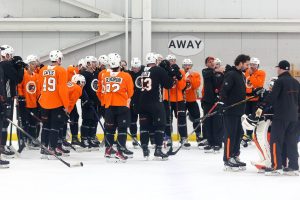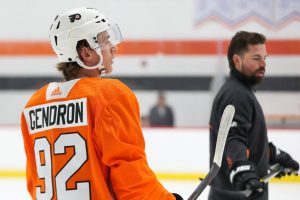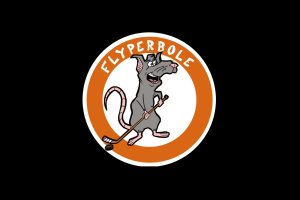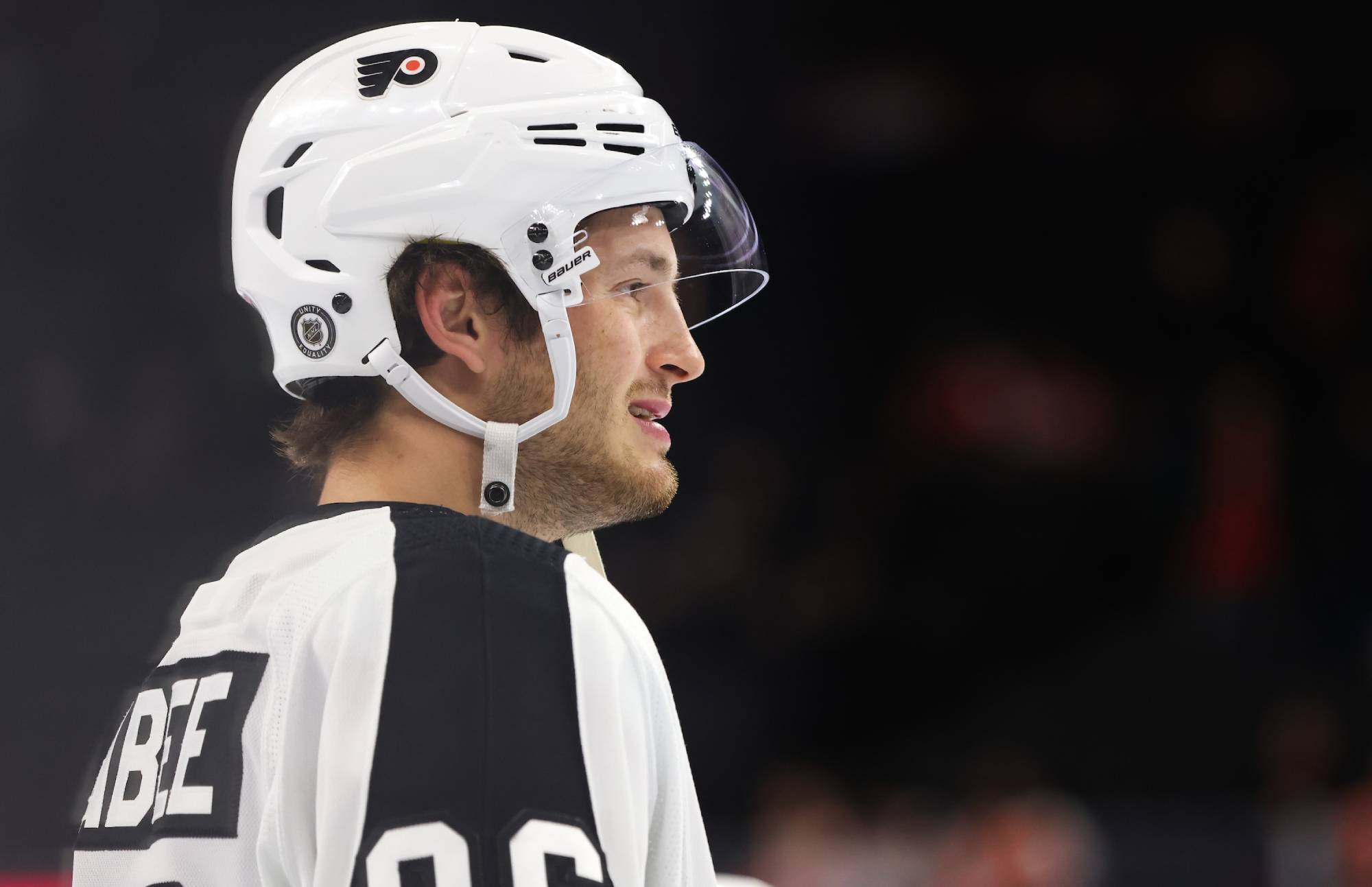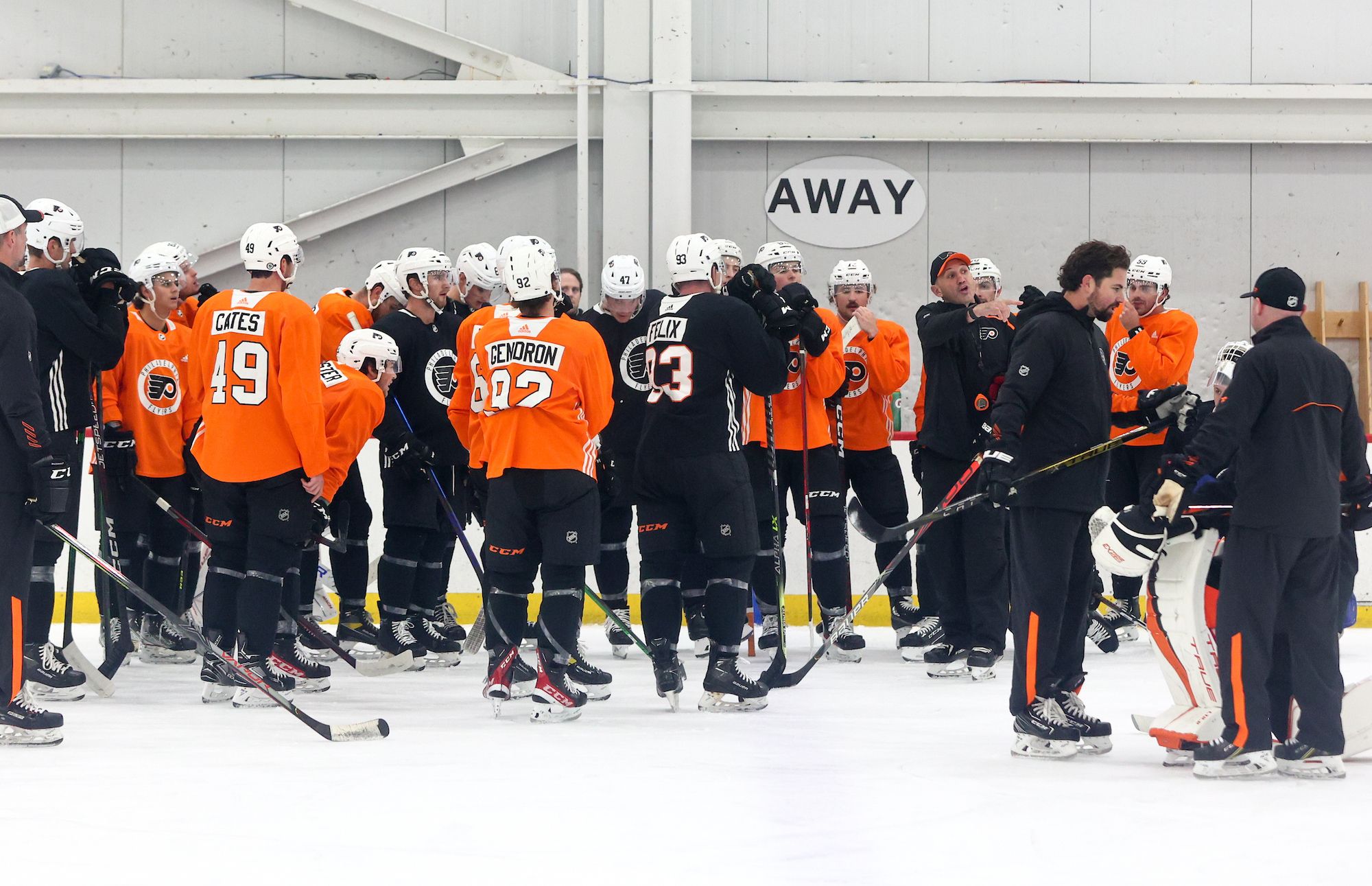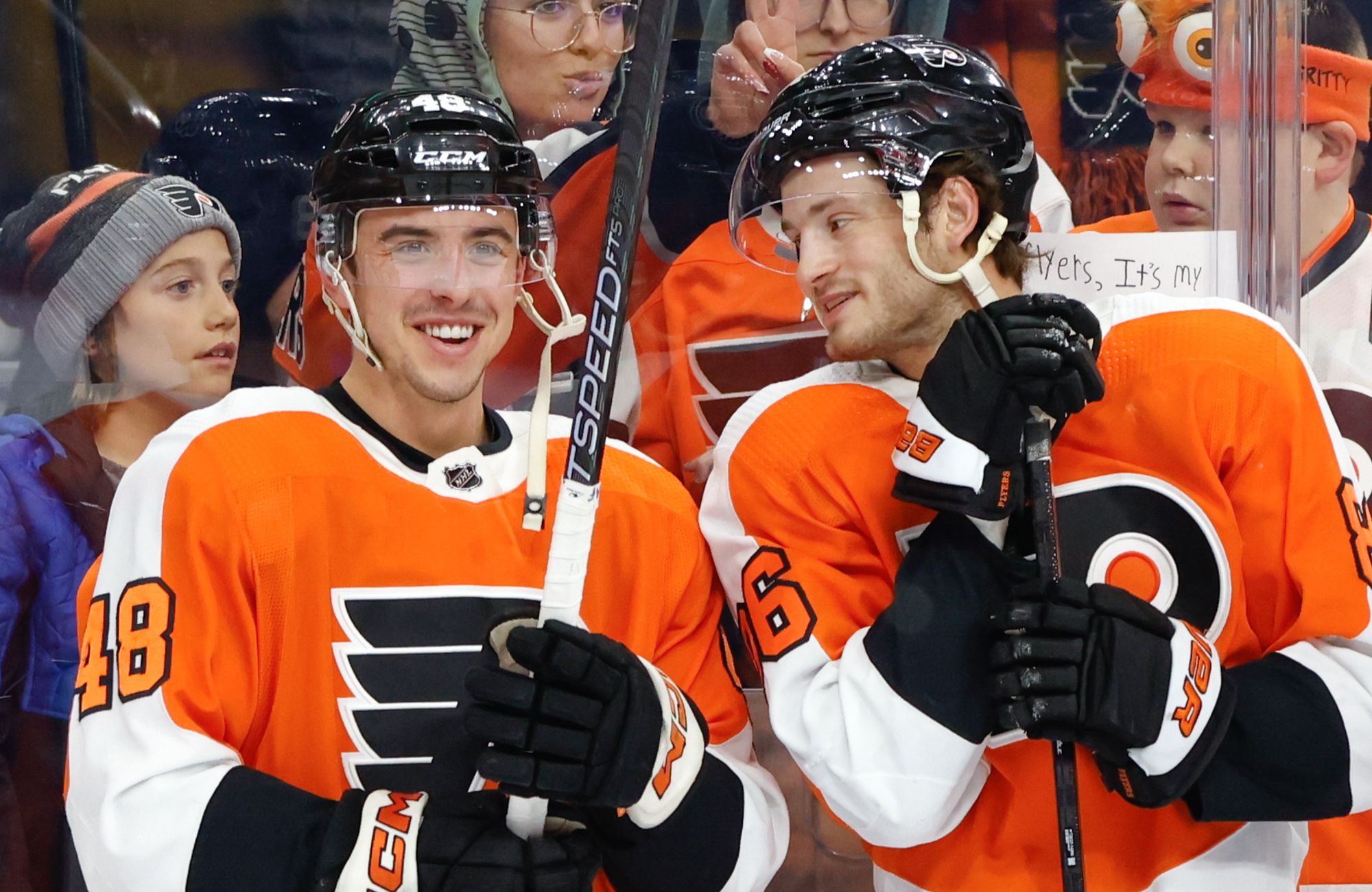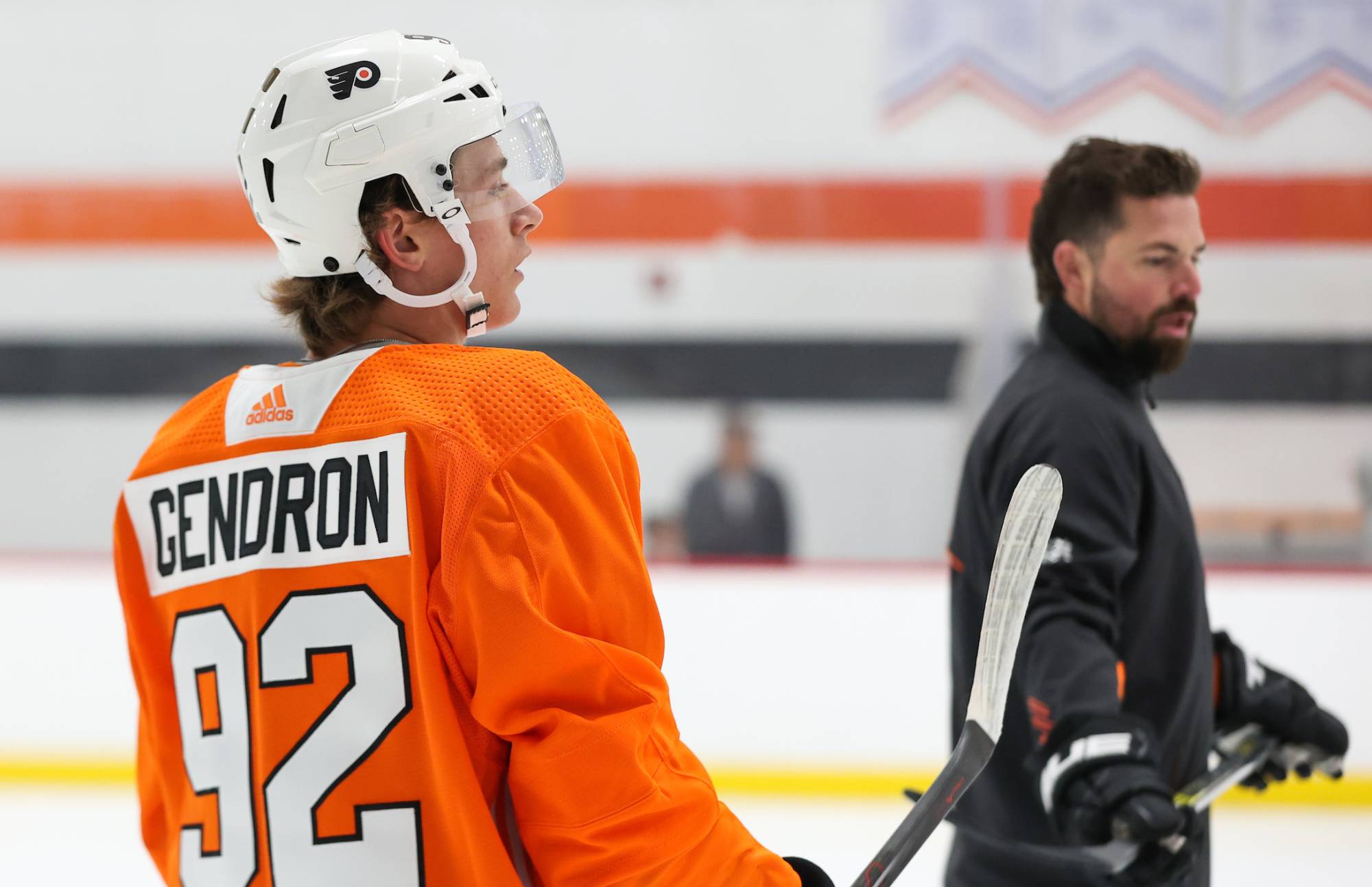Ed Snider gave an exclusive interview to the Inquirer over the weekend in which he discussed the past season and the Flyers plans going forward. Let’s just go quote-by-quote and analyze Snider’s most-pressing thoughts.
“I don’t want this to sound like excuses because all teams had a shortened schedule and just a one-week training camp,” Snider said. “Some teams did well [the previous season] and were happy with their system. We got knocked out by New Jersey in the second round, and New Jersey dominated, and I think the coach wanted to tweak the system. And we ended up with the worst schedule in the league. At one point, we played 20 games, and Boston had played 15 [actually, 14]. You already have a compressed schedule, and ours was compressed more than anyone else’s. And when you have tweaking, no practices, and a bad start, we never recovered.”
There’s no denying that the Flyers played a tough schedule this season. As Snider mentions, the draw was extremely tough to start the year and there’s an argument to be made that it hurt the Flyers as they tried to get into a groove.
But we can’t forget about the other side of the coin, either. The rough start also meant that the Flyers had a much easier second half of the season than most of the league, and if Snider’s logic makes sense, they should have had a much stronger finish to the year.
That didn’t happen. In their first 24 games, the Flyers compiled 23 of a possible 48 points. In the final 24 games, they compiled 26 of a possible 48 points. An extra three points in that first half of the year wouldn’t have made a difference. The Flyers would have finished in ninth place instead of 10th place.
Maybe the Flyers would have been a playoff team over an 82 game year — tough to know that definitively one way or the other. They seemed like they were heating up a bit in the final eight games or so, and if they could’ve extended that for another couple of weeks, they could have gotten back into the hunt.
But does even this most optimistic of outlooks change much? Would they have been a Cup contender in a full season? You watched this team all season and can be the judge of that.
“Most teams would have a difficult time recovering from a depleted defense like ours,” Snider said. “It was sort of like everything that could go wrong did go wrong. It was the perfect storm.”
…
“Gus came on as an NHL defenseman and as a guy who can move the puck, and some of the other young defensemen showed tremendous promise,” he said.
Snider is referring largely to the injuries here, and yes, it’s true. The Flyers lost a lot of players to injury this year, especially on defense. But if we’re just blaming the defensive struggles on the injuries, we’re going to be in for a rude awakening when things don’t change next year.
There are still questions that need deeper answering about the growth of some young players on defense, namely Luke Schenn, who did clearly surpass expectations. How much did he surpass those expectations? How much did he benefit from being paired with Kimmo Timonen all year? We’ll dive into all of that this offseason and hopefully find more good news than bad news.
Schenn was surprising in a positive way. We know that much. We also know that guys like Erik Gustafsson and Oliver Lauridsen were also contributors in ways that we didn’t expect. They were bright spots.
But overall, we knew the issues with the defense coming into the season. We knew they were going to be subpar back when they were healthy.There’s a chain of events here that’s very clear, and none of it has to do with injuries:
1) The Flyers lost their even strength ice time leader from a year ago, Matt Carle, largely because they had extravagant fantasies about Ryan Suter and/or Zach Parise …
2) … they decided to make that important defensive cog wait for a contract because of those fantasies. He didn’t want to wait and signed elsewhere …
3) … and they opted for a long-shot offer sheet on Shea Weber as their last ditch attempt at filling that hole on defense. It was a ballsy move and we’re glad they did it given the circumstances, but remember that they put themselves into those circumstances.
Would the Flyers have been better on defense if Braydon Coburn, Nicklas Grossmann and Andrej Meszaros were healthy all year? Yes, of course they would have been. But that doesn’t change Kimmo Timonen’s age or the fact that Luke Schenn, for all of his improvements this year, was not a No. 1 defenseman.
It also doesn’t change that it’s now been nearly two seasons since Chris Pronger played his last game, more than enough time to put together and execute a game plan to move forward on defense.
Add to all of this that the Flyers haven’t drafted and developed a defenseman in-house since Joni Pitkanen and well, let’s just say that the injuries aren’t the reason the Flyers did not have a strong defense this season, nor can they expect one going forward if the status quo remains.
“He’s the same coach who won a Stanley Cup in Carolina and took us to the Finals,” Snider said. “I like him and his style of play.”
…
“No one is happy with the year we had. I’m not happy with Ed Snider, so let’s start at the top. Paul’s not happy, and he knows we tried to do things and didn’t have success. Paul’s overall performance is outstanding.”
Snider’s message here seems pretty clear: Despite the disappointing season, big changes do not need to be made. I don’t think it’s smart to make a rash decision and fire the coach and/or the general manager based on a shortened season, and I think it’s nice to hear this sort of rational thinking from the guy all the way at the top. It’s not reactionary.
Then again, the other side of the coin: Do you blame Paul Holmgren or Peter Laviolette for the Flyers troubles? You can come to that conclusion without being reactionary. Another debate entirely…
“It’s not too small of a sample,” Snider insisted. “It’s not like he’s just a kid right out of juniors. He had great credentials coming into the NHL, and those credentials don’t just float away.”
This refers to Steve Mason. He’s talking about the seven games he played with the Flyers this season, in which the goalie compiled a .944 save percentage and a 1.90 goals against average. He’s saying that no, this isn’t too small of a sample to judge Mason’s game.
/jaw drops
For starters, let’s not call Steve Mason’s credentials coming into the NHL “great.” He had a .916 save percentage and a 2.90 goals against average in 116 games as an OHL goaltender. He was fine. He was good. He wasn’t great.
But okay. “Those credentials don’t just float away.”
YES THEY DO.
Mason had a strong first year as an NHL rookie. He was the 69th overall pick in the 2006 draft, and when he made the jump to the NHL in 2008-09, his .916 save percentage, 2.29 goals against average and 10 shutouts (!) were enough to make people notice. He won the Calder Trophy largely on the back of those 10 shutouts.
In his next four seasons, however, Mason’s impressive credentials floated to another galaxy. He barely cracked a save percentage of .900 — .901 in back-to-back years, .894 in 2011-12 and then .899 in his pre-deadline days with Columbus this past season. In those four years, he’s had nine total shutouts, one fewer than the gaudy rookie year number that in part brought him the Calder Trophy.
Oh, and as we’ve discussed before, “there’s a case to be made that he’s literally been the worst goalie in hockey since the full-season lockout.”
What Steve Mason did in juniors is irrelevant. What he did in his rookie year is irrelevant. Can he be a good goalie at the NHL level? Well, it’s clear the Flyers believe he can be, and let’s hope they’re right. But he has to prove that, and Ed Snider is insane for thinking that seven games is enough time to prove that.
“If Paul has to get under the cap for a specific reason, he will. But if you’re not getting a player, you don’t have to,” Snider said. “It’s a game of chess, and that’s still up in the air.”
I don’t know if Ed Snider understands how the salary cap works.
The Flyers have $70.7 million committed to 25 players next season. The salary cap will be $64.3 million. Paul Holmgren has work to do. It’s not a game of chess. It’s black and white. If the Flyers want to add more players, they have to clear even more space. This is math. Very basic math.
***
Some of these comments aren’t surprising. Some of them are benign, some are scary. I don’t know if they give any insight into what the Flyers are thinking generally this offseason, but in summation, I continue to hope that Ed Snider remains as hands off as possible and that he lets his hockey people do their work.

